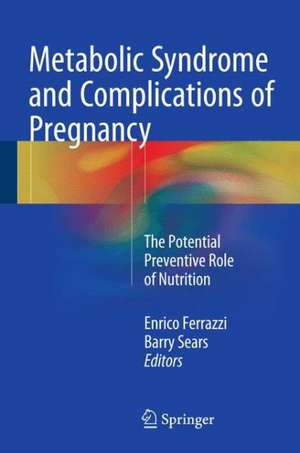Metabolic Syndrome and Complications of Pregnancy: The Potential Preventive Role of Nutrition
Editat de Enrico Ferrazzi, Barry Searsen Limba Engleză Hardback – 9 iul 2015
The book’s opening sections discuss inflammation in the context of pregnancy, including the nature of the placenta as a proinflammatory tissue. In the main body, it points to new possible connections to truncal obesity, inflammation, metabolic syndrome, and major obstetrical syndromes, including preeclampsia, gestational diabetes and pre-term delivery.
Based on the insights offered by this analysis, the remainder of the book focuses on a variety of nutritional measures and diets that can be of benefit during and beyond pregnancy. Readers will learn how the higher level of compliance with medical instructions during pregnancy can be capitalized on to ensure enduring health benefits for mother and child alike.
Preț: 289.14 lei
Preț vechi: 304.35 lei
-5% Nou
55.33€ • 59.16$ • 46.13£
Carte indisponibilă temporar
Specificații
ISBN-10: 3319168525
Pagini: 140
Ilustrații: X, 238 p. 46 illus., 36 illus. in color.
Dimensiuni: 155 x 235 x 17 mm
Greutate: 0.53 kg
Ediția:2015
Editura: Springer International Publishing
Colecția Springer
Locul publicării:Cham, Switzerland
Public țintă
Professional/practitionerCuprins
Part I: Truncal Obesity, Inflammation, Metabolic Syndrome: An Insight.- The Role of Inflammation in Truncal Obesity and Metabolic Syndrome.- Food Clusters Excess and Low Grade Inflammation.- The Effect of Diet And Probiotics on the Human Gut Micro biome.- Part II: Inflammation and Physiology Of Pregnancy.- Pathology of the Placenta: A Continuum Spectrum of Inflammation from Physiology to Disease.- Obesity and Inflammation in Pregnancy.- Inflammasome and Pregnancy.- PCOS and Pregnancy Impact of Endocrine and Metabolic Factors.- Part III: The Potential Value of Nutrition and Nutriceutical Supplementation to Prevent Obstetrical Complications.- Gastroenterological Symptoms in Pregnancy: Warning Signs of Unhealthy Nutritional Profile.- Micronutrients and the Obstetrical Syndromes.- Maternogenic Preeclampsia and Gestational Diabetes Byproducts of the Accelerated Metabolic Syndrome in Pregnancy.- Immune System, Nutrition and Placental Preeclampsia.- Lifestyle Intervention and Prevention of Spontaneous Preterm Delivery in Obese Pregnant Women.- Part IV: Future Dietary Strategies to Reduce Inflammation and Metabolic Syndrome by an Healthy Eating Plate.- Maternal Diet and Intergenerational Transmission of Metabolic Traits.- Anti-Inflammatory Diets.- Let’s Make It the Real Mediterranean Diet Not the “Supermarket Standard Feeding Plus a Leaf Of Basil”.- Nutrition Around the Clock: Does Time for Good Food Make a Difference?.
Textul de pe ultima copertă
This book explores the nature of pregnancy and metabolic syndrome as proinflammatory conditions and explains how pregnancy provides a window of opportunity for preventing the lifelong complications of metabolic syndrome, during which key risk factors can be identified and beneficial dietary changes can be implemented.
The book’s opening sections discuss inflammation in the context of pregnancy, including the nature of the placenta as a proinflammatory tissue. In the main body, it points to new possible connections to truncal obesity, inflammation, metabolic syndrome, and major obstetrical syndromes, including preeclampsia, gestational diabetes and pre-term delivery.
Based on the insights offered by this analysis, the remainder of the book focuses on a variety of nutritional measures and diets that can be of benefit during and beyond pregnancy. Readers will learn how the higher level of compliance with medical instructions during pregnancy can be capitalized on to ensure enduring health benefits for mother and child alike.
Caracteristici
Discusses the role of healthy nutrition in those at risk of metabolic syndrome
Describes dietary measures to help prevent the major obstetric syndromes
Descriere
This book explores the nature of pregnancy and metabolic syndrome as proinflammatory conditions and explains how pregnancy provides a window of opportunity for preventing the lifelong complications of metabolic syndrome, during which key risk factors can be identified and beneficial dietary changes can be implemented.
The book’s opening sections discuss inflammation in the context of pregnancy, including the nature of the placenta as a proinflammatory tissue. In the main body, it points to new possible connections to truncal obesity, inflammation, metabolic syndrome, and major obstetrical syndromes, including preeclampsia, gestational diabetes and pre-term delivery.
Based on the insights offered by this analysis, the remainder of the book focuses on a variety of nutritional measures and diets that can be of benefit during and beyond pregnancy. Readers will learn how the higher level of compliance with medical instructions during pregnancy can be capitalized on to ensure enduring health benefits for mother and child alike.
